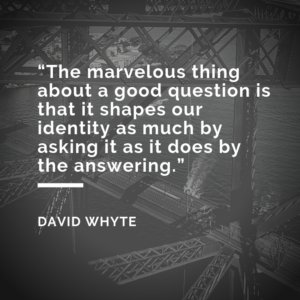“The marvelous thing about a good question is that it shapes our identity as much by asking it as it does by the answering.” – David Whyte

For those who know me, you’re about to laugh when I say this – I’m all about the answers sometimes. And I usually want those answers quickly.
I live in NYC and fast-paced anything is a part of my spirit.
However, I read this quotation, and it made me pause. Then it kept creeping back to me throughout the day. I couldn’t help but think about the transformational work of the STEM Learning Ecosystems and the power of questions in the formation of ‘their’ identities of ecosystems.
Design Studios are common practice for early forming Ecosystems. A facilitated session that forces leaders from different backgrounds and areas of expertise to ponder things like:
What are the most pressing challenges of our community?
How might this community look different if we had a chance to rebuild structures and pathways?
Who do the systems in place work for? Who might they be excluding / hurting?
How do we change things? What relationships must exist to do this?
Those are big questions right? In a room full of community leaders, even ASKING them can be a transformational act.
Inquiry like this can inevitably change our identity. It causes us to pause and think about how the auto-pilot type rush of our daily work and routines might be contributing to the very problems we say we want to solve.
For example, if a community is facing a talent pipeline issue, asking ‘why does this challenge exist’ could lead to a much larger discussion that shifts systems of education, training and recruitment.
That question might lead to new partnership development between post-secondary and K-12 schools.
It could lead to more business involvement in learning environments to expose young people and their families to opportunities they never knew existed.
It could open opportunities for historically marginalized populations.
It might even inspire legislators to amend credentialing requirements and provide state funding to tackle the issue.
The very act of gathering different leaders in a community in one room for a two-hour meeting is transformational. Getting very busy and very important people together to ask what they envision for their community’s future is an identity changing act.
So pausing from hustle and bustle of my own routine, I say thank you to the 84 communities that make up the STEM Learning Ecosystems Community of Practice. I recognize every hour of extra time you commit that you absolutely don’t have in your day.
I am humbled to be a part of work that causes us to question ourselves and inspire greater futures.
With so much gratitude,
Veronica Gonzales
Deputy Director
STEM Learning Ecosystems Community of Practice
